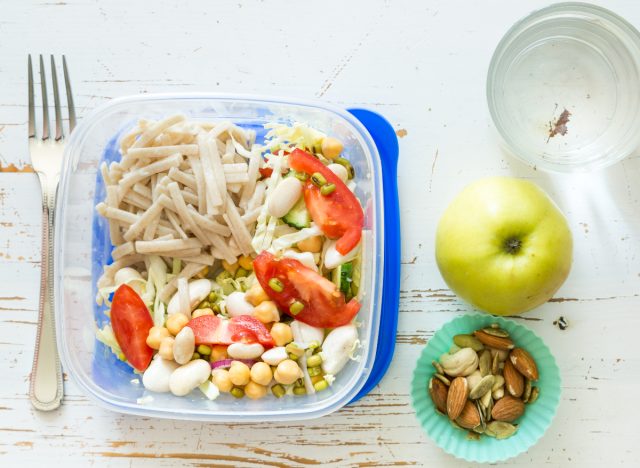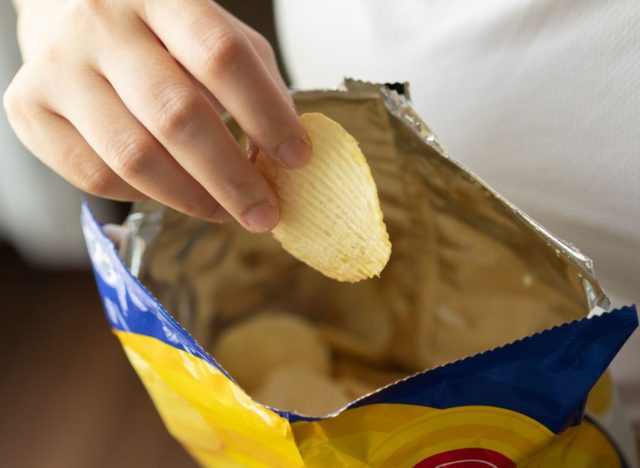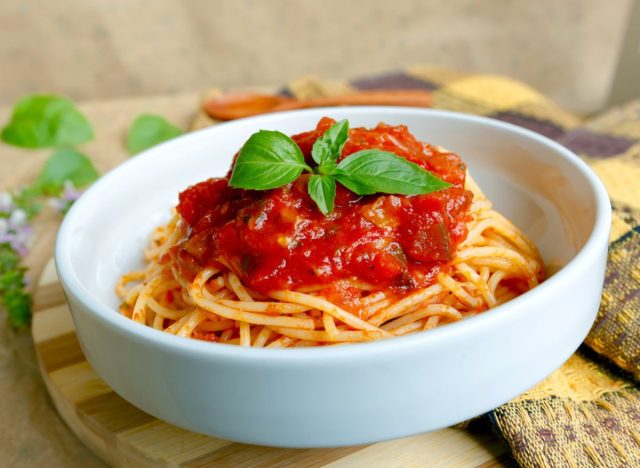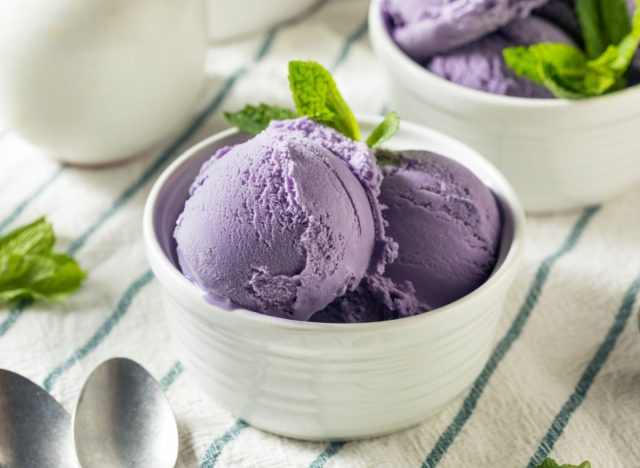There are many things to consider when you’re on a weight-loss mission. Exercise and eating the right foods are key players, but portion control is equally as important. Portion sizes are helpful for setting limits and boundaries so you don’t overindulge. We’re here to break down the ideal portion sizes for weight loss and common portion size mistakes to avoid.
“When portions are in control, it keeps calories in control. And although weight loss isn’t only about consuming fewer calories than your body needs, it does matter. When people tend to eat large portions, they tend to overconsume calories and gain weight,” The Nutrition Twins®, Tammy Lakatos Shames, RD, CDN, CFT, and Lyssie Lakatos, RD, CDN, CFT, who sit on our Medical Expert Board explain.
There are many reasons why people eat beyond being hungry. For instance, we eat because food tastes really yummy or when we are sad, stressed, or bored. It’s sometimes easy to eat without even thinking about it or in social situations.
“All of these can cause us to eat much more food than what our body requires,” The Nutrition Twins warn. “A lot of excess food and calories can be consumed if you let those other factors guide you. Add that many people don’t recognize their feelings of hunger and fullness, so they don’t know when to eat—or stop eating, so they can’t use their hunger as a guide for how much food they should eat to fuel them without overeating.”
What Are Ideal Portion Sizes for Weight Loss?

Now, what are the ideal portion sizes for those looking to lose weight?
According to the Nutrition Twins, “While we have general guidelines, we typically make more personalized recommendations when working with our clients depending on their size, activity and stress level, etc., and we tweak it further based on how they feel, how their body responds, if it makes them too hungry, etc.”
As general guidelines, this is what they typically recommend:
- Vegetables: Always incorporate at least 2 cups of lightly steamed (or raw) veggies and leafy greens.
- Protein: Large males should consume 5-7 ounces of protein in each meal; small females should consume approximately 3-4 ounces of protein per meal. “Everyone else falls in between the two,” The Nutrition Twins add. “Again, a good rule of thumb is to use the size of the palm to guide you.”
- Carbs: Large, active males should consume approximately 1.5-2 cups of carbohydrates per meal; small females should have roughly ½ to 1 cup of carbohydrates in each meal. Everyone else falls in between.
- Fat: Large males should consume close to 1.5-2 tablespoons of fat; small females should consume approximately 2 teaspoons of fat in each meal.
- Snacks: “This is a general guideline, but we try to have our clients combine protein and fiber for steady energy and blood sugar [and] satisfaction,” The Nutrition Twins explain. “We recommend no more than 150-200 calories.” Appropriate portion size examples include: ½ apple with 1 tablespoon of peanut butter, 1 cheese stick with a rice cake or several crackers, and a cupped handful of each cottage cheese with berries.
Common Portion Size Mistakes to Avoid:

1. Assuming That Restaurant Sizes Are Proper Portion Sizes
Restaurants are a common place where portion size errors are made. Many restaurants overdo it with large portions—especially refined carbs—to make you feel as though you’re getting the biggest bang for your buck.
“Assuming that the portion large portion we are served is the right portion for us is a huge mistake that easily causes weight gain,” The Nutrition Twins say.
2. Not Being Mindful of Serving Sizes for Carbs
It’s easy to grab your favorite breakfast cereal and fill your bowl up to the top with it.
“Mistakes we see often with new clients are carb ones—like pouring a bowl of cereal,” The Nutrition Twins explain. “They assume a bowl full of cereal is the portion, when the serving is typically only ½ to 1 cup, but many bowls hold two to three times this much.”
3. Eating Straight From the Bag or Box
Eating straight from the bag, box, or container is another place to go wrong.
“It becomes virtually impossible to know how much you ate—unless you finish eating everything in the bag or container—which is typically not a good sign,” The Nutrition Twins point out.
How Can You Estimate Portion Sizes Without Measuring?

The Nutrition Twins typically recommend a few references to guide you in the right direction when eyeballing portion sizes.
“We also have [our clients] weigh/measure some common foods that they eat at home every week or so, to get familiar with portions and to help them to learn to eyeball and compare sizes to the size of their hand, etc.,” they note.
Here Are a Few Common Ways to Estimate Portions:

- One serving of poultry or meat = the size of your palm
- One 3-ounce serving of fish = the size of a checkbook
- One-half cup of ice cream = the size of a tennis ball
- One serving of cheese = the size of a set of dice
- One-half cup of cooked pasta, rice, or snacks like pretzels or chips = the size of a tennis ball or a rounded handful
Alexa Mellardo

